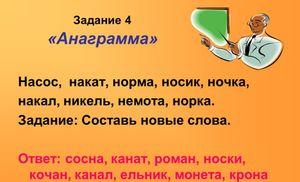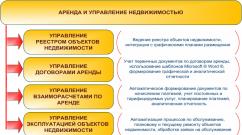Class hour "save time". Class hour A minute saves an hour Proverb A minute saves an hour
1. Opening remarks.
Riddles about time.
What cannot be returned?
What is faster than thought?
It has no legs and no wings,
He flies fast, you won't catch him.
2. Practical work with clocks.
What helps us recognize time? (watch)
What watches do you know? (pocket, wall, etc.)
Determine what time it is on a watch model?
An exercise in telling time.
What time periods do you know?
(Second, minute, hour, day, week, month, year, century)
Do you know how to calculate time correctly?
How many minutes does it take to get from home to school?
What does this time depend on? (speed and distance)
How many minutes will it take to put things in your briefcase? Get ready for math class?
(time trial)
Which row will line up faster?
Read the proverb: “Time is not money, if you lose it, you won’t find it.” When do they say that?
3.Work on creating a daily routine
Guess riddles and write down the first letter
from the answer:
1) As many as 25 teeth for curls and tufts.
And under each tooth
The hair will lie in a row. (Comb.)
2) Performer of the song “Smile”. (Raccoon)
3) I blindfolded Yurka -
My brother and I play (blind man's buff.)
4) The little bird will dive with its nose,
He wags his tail and leads a path. (Needle.)
5) Smooth. It's fragrant. Washes clean. (Soap.)
6) A cloud settled in the bathroom.
Rain pours from the ceiling onto my back and sides. (Shower.)
7) All their lives they walk side by side, but they overtake each other
they can't have a friend. (Legs.)
8) If it weren’t for him, I wouldn’t have said anything. (Language.)
What happened? DAY REGIME
What is this? Daily routine.
How do you understand this proverb?
ORDER SAVES TIME
When is it especially important to maintain order?
Maintaining order is especially important for athletes, astronauts, and schoolchildren in order to grow
healthy.
How do you maintain your daily routine?
Poems about a man and his watch
S. Baruzdin
The clock is counting the seconds,
They keep track of the minutes.
The watch won't let you down
Who saves time?
Who knows how to live by the clock?
And appreciates every hour,
This is not necessary in the morning
Wake up 10 times.
And he won't talk
Why is he too lazy to get up?
Do exercises, wash hands
And make the bed.
He will have time to get dressed on time,
Wash and eat
He will have time to stand at the machine,
Sit at a desk at school.
Friendship with watches is good!
Work, rest,
Do your homework slowly
And don't forget the books!
So that in the evening, when you go to bed,
When the time comes,
You could confidently say:
It was a good day!
Physical education minute
The clock strikes on the old tower:
Tick-tock, tick-tock.
And the wall ones faster:
Tiki - taki, tiki - taki.
And the pocket ones are knocking:
Tick-tock, tick-tock, tick-tock.
Imagine that all the clocks on earth have disappeared.
What will happen then?
How do we save time?
How many minutes does the lesson last? Change?
How many minutes do we practically use for work?
Examples of wasted time and reasons for it.
Collective discussion (being late, talking in class that distracts others, taking a long time to prepare for the lesson
etc.)
What should we do during the break?
Poem by B. Zakhoder “Change”
Children read.
“Change, change!” -
The call is ringing.
Vova will definitely be the first
Flies out of the threshold.
Flies over the threshold -
Seven are knocked off their feet.
Is it really Vova?
Dozed off the entire lesson?
Is it really Vova?
5 minutes ago not a word
Couldn't you tell me at the board?
If he is, then undoubtedly
It's a big change with him.
You can't keep up with Vova!
Look how bad he is!
He made it in 5 minutes
Redo a bunch of things:
He put 3 steps
(Vaska, Kolka and Seryozhka),
Rolled somersaults
He sat astride the railing.
Dashingly plopped off the railing,
Got a slap on the head
He gave someone back on the spot;
He asked me to write off the tasks -
In a word, I did everything I could!
Well, here comes the call again.
Vova trudges back to class.
Poor! There is no face on it.
“Nothing,” sighs Vova, “
Let's relax during class..."
What can you do in 1 minute?
Turn to the clock and say the tongue twister:
On the hill near the slide
Cost 33 Egorki:
1 Egorka, 2 Egorka, 3 Egorka...
Physical education (relaxation)
In 1 minute we can go to the river bank to sunbathe.
Put your head in your hands, close your eyes, enjoy
warm sun; listen to the bees buzzing and chirping
grasshoppers. A butterfly landed on your palm. Look at it.
Then her wings fluttered to help her fly,
blow on it.
Solve problems in 1 minute.
1. 2 sausages are cooked for 6 minutes. How many minutes does it take to cook 1 sausage?
How do you understand the proverb: If you miss a minute -
Will you lose an hour?
Order:
- Time only moves forward.
- Follow your daily routine.
- Go to bed and get up on time, sit down for your homework at the same hours.
- Never be late for anything, take care of others’ time.
- You must not be late for lessons so as not to distract the teacher and students from their work.
- Come visit at the appointed time.
- Learn to value your time and your parents’ time.
- People need time. It cannot be returned, so it must be appreciated.
How do you understand the proverb: Time is more valuable than gold?
L.N. Tolstoy wrote: “Have a goal for life, a goal for a certain time, a goal for the year,
for the month, for the week, for the day and for the hour and for the minute, sacrificing the lower goals to the higher ones.”
Question: Do you have a goal? What are you missing to achieve it?
All students are given the floor. Everything that is missing to achieve the goal is written on the board.
Patience Time Knowledge Perseverance Willpower
Teacher: Yes, most often, for some reason we don’t have enough time. That is why we will talk today about time and how precious it is for any person.
One wise man said: “Time is the fabric from which life is woven.”
Question: How many years should a person live?
All students express their opinions.
Teacher: Scientists say that the average human life expectancy is at least 100 years.
Question: Why is human life expectancy 2–3 times less?
All students express their opinions. The reasons listed by the students are recorded on the board.
Health Failures Choosing a profession associated with health risks Disappointments
Bad habits
Teacher: Indeed, there are a lot of reasons. One of them is the inability to choose the right profession, to determine the path of life taking into account one’s inclinations and abilities. As a result, mastering the profession is slow and late, and not everyone achieves mastery in it. Hence, dissatisfaction with work and various diseases.
Human capabilities are great. As a result of systematic, purposeful, organized work, much can be achieved. However, even talented people often achieve little if they do not know how to value time. And vice versa, many people, even those who do not have outstanding abilities, manage to achieve great success in life if they take care of time and properly organize their work and their lives. An example of the ability to mobilize one’s internal reserves is the life of Professor A.A. Lyubishchev. Over his 56 years, he made many discoveries in the field of zoology, genetics, and philosophy.
However, many people waste their precious time. They live as they please, going with the flow, lead a chaotic lifestyle, do not use their capabilities and abilities, and put off many important matters for the future. It is no coincidence that the Roman philosopher Seneca noted: “As long as we are going to live; life passes."
Assignment: Name the main reason why precious time is wasted.
The reasons for wasting time are written down on the board:
Disorganization Excessive fuss Inability to plan your work Incorrect organization of your life
Teacher: You need to learn to take care of your own and other people’s time now, while studying at school. These are the years of not only learning, but also the formation of personality, preparation for future life. The value of time has now increased significantly, because... the flow of information has increased. And rather, it is necessary to say: time is more valuable than money, and not the American “time is money.” Wasted time can no longer be returned, but lost money can be earned.
Date: 12.09.16
Subject: Know the value of minutes, and the count of seconds.
Goals and objectives:
1) teach a sense of time, the ability to use it wisely, with benefit for work and study;
2) development of cognitive interest, attention, activity, work culture;
3) develop a sense of time, the ability to use every hour, every minute wisely for business.
Equipment: notes, topic of the lesson, clock, signs with feelings, daily routine.
Progress of the lesson:
Org. moment.
Main part.
Opening remarks.
U. Every teacher, every parent gives you advice on how to prepare lessons in certain subjects. How to write an essay? How to read books?
Our country needs educated people. This means that studying is considered your main task. And in order to study well, we need to properly distribute study and rest time.
But sometimes we don’t know how to manage time correctly, so it turns out that we don’t always have time to do something. Often what gets in our way is “just a little more.” He is called an insidious predator that steals time. A little more can rob a person of several hours at once. You have to go for a walk, but you still watch TV a little, you have to sit down for your homework, and you still walk a little. And today in class we will learn to avoid this insidious predator “just a little more.”
2. Talk about feelings
U. Nature gave man five senses. But there is also a sixth sense - the sense of time. A person must develop it himself.
IN. Children, what is this sense of time?
IN. Why do you think it is necessary to have a sense of time?
U. Guys, you are all right, of course. Without a sense of time, chaos and disorder will reign in the world. And nothing good will come of it.
3. U. Nowadays, you can’t live even a minute without keeping track of time.
IN. What is more valuable in time, an hour or a minute?
ABOUT. Minute.
U. That's right, guys. No wonder there is an old Russian proverb: “A minute saves an hour.”
IN. How do you understand this proverb?
3. Minute
U. Fine. Let’s “listen” for a minute and think: is a minute a lot or a little? (children sit quietly for a minute and think about the question, then listen to the answers).
Here, listen to some facts: in one minute, factories produce 13 televisions, 11 new refrigerators, 4 new cars and 2,700 books. Just a minute! And if suddenly all the plants and factories in the country stopped working for one minute, then the state would lose 50 million rubles. That's how much a minute costs.
4. What can you do in a minute?
Guys, there are pieces of paper on your desks. Write what you can do in one minute? (children work independently for three minutes).
Checking work
5. Daily routine
The clock is counting the seconds,
They are counting the minutes.
The watch won't let you down
Who saves time?
Hour by hour, year by year
The clock is always moving forward.
Everything needs to be thought by the hour,
Then you will be satisfied yourself.
Friendship with a watch is good,
Work, rest,
Do your homework slowly
And don't forget the books!
So that in the evening, when you go to bed,
When the time comes,
You could confidently say:
It was a good day!
IN. Guys, what is this poem about?
ABOUT. This poem is about the fact that you need to follow a daily routine and then, during the day, you will have time to get everything done.
U. You're right. Now let's create a daily routine with you.
| Time | What to do |
| Getting up, exercising, hygiene procedures. |
|
| Walk in the fresh air |
|
| Prep |
|
| Getting ready for school |
|
| Road to school |
|
| School |
|
| The road home |
|
| Rest, dinner |
|
| Walk in the fresh air |
|
| Preparing homework |
|
| Calm games, helping the family |
|
| Getting ready for bed |
|
The final part.
Security questions:
Guys, what did we talk about in class today?
Why is it necessary to save time?
What should schoolchildren do to save time?
Final word:
U. There are many interesting and surprising things in the world, that a person who does not value his own and other people’s time is like a beggar living among treasures. He lives as if he were blind or deaf. The mind and sense of time need to be trained. Learn to take care of your and other people's time. Never be late, spend your time usefully, and you will become worthy people. And most importantly, the more things and activities you have to do, the more free time you will have. This will be confirmed by anyone who knows how to correctly distribute days, hours, minutes, seconds.
Organization: LPR State Educational Institution “Chervonopraporskaya School No. 34”
Locality: Chervony Prapor settlement, Perevalsky district, Lugansk region
Time management “The art of keeping up”
Purpose of the event: expand children's understanding of the rational use of time; to form a positive moral attitude towards such character qualities as commitment, organization, composure, to encourage planning one’s time, organizing workloads, and following a daily routine. Teach students to appreciate every minute.
Epigraph
Time is the only thing that cannot be accumulated; it is not preserved or increased. Time is generally the most important thing (c) Yamaguchi Tadao
On the board there is 1 slide “Time management”
I Hello guys! Today we will talk to you about a very important phenomenon in life - about our time, how we value it, and most importantly, how productive we are. Things scattered around the room, a ringing phone, unlearned lessons and you with the thoughts: “I can’t do anything!” Surely many of you recognized yourself.
Tell me guys:
What cannot be returned? (youth, time)
What is faster than thought? (time)
Yesterday it was, today it is and tomorrow it will be. (day, time)
Students answer: time.
(The clock ticks to the music)
They rustle and work secretly, like mice,
The wheels of our watches.
The clock is counting the seconds,
They are counting the minutes.
The watch won't let you down.
Slide 2 “Time is your best friend” with pictures
Teacher: Every house has a clock. They are everywhere, they show our time. What is time? Let us then think about what time is, what its features are, what distinguishes it from everything known in the world.
Of course, time is not a clock or an alarm clock. They are just machines, counting down this very time. Remember, there are things that we often talk about and know well, but which we have never seen or touched with our hands. Air, for example, is invisible, and you cannot grasp it with your hands. But you simply can’t live without it! So is the time! It is invisible, it is odorless, colorless. And you can’t touch it with your hands. You won’t be able to hide it, and you won’t be able to give it to a friend. But you can lose it! And elusive time is very expensive. You can also hear: “Time is your best friend.”
Time is a wealth given by nature to man free of charge. And we can’t do without time: we need it like air!
Teacher: Guys, look at the desk, what do you see?
(watch)
What hours?
(sand, electronic, mechanical)
Let's start our class time... And together with you we will feel the passage of time
(musical transition)
Class teacher: - Guys, one of the values a person has is time. And your success depends on how we learn to protect, extract and spend it.
But do we always use time correctly? Are we wasting it?
Let's watch a short cartoon.
(Cartoon about chronophages.)
Let's understand the concept of chronophages - time eaters, because this is a very multifaceted thing.
Who are chronophages?
(children's answers - time sinks, time wasters
That's right guys, let's turn to the slide.
Teacher:
Slide 3 – Chronophage concept
Chronophage- one of the modern, common terms for time management, where “chronos” means time, and “phage” means absorb, devour, denoting any distracting objects that interfere and distract from the main activity.
Chronophages can be animate (for example, friends with empty calls, conversations) or inanimate (Internet computer games, TV, etc.).
Now we'll play. Some students will be chronophages and show us the reasons why precious time is lost
And others are time managers who will give ususeful tips for rational use of time.
Slide 4 Tree with apples
Teacher handing out signs
(There is a tree on the table, the chronophages have tablets in the form of worms, and the time managers have apples)
On the table you see a tree, chronophages have tablets in the form of worms - time sinks, and time managers have apples - the fruits that we get from the organized use of time.
Come, name and attach your signs.
Chronophages:
Non-compliance with the daily routine.
Excessive passion for the game.
Lack of order in the workplace, in the closet.
Inattention in class.
….Postponing things until later
Watching TV for a long time.
Inability to complete a task.
Time managers:
Don't sit at the computer or TV for more than 35 minutes.
Don't do ten things at once.
Don't waste time on long telephone conversations, save time and money.
Learn to say no
Finish the work to the end.
Take care of your time and that of others. Less words - more action.
You must sow today to reap tomorrow.
Guys. Look what a beautiful tree it turned out to be! A tree is a person’s life, And there are more good fruits on the tree. Follow the advice of our time managers. Cultivate self-control in yourself. Self-organization is very important and it should bear fruit. As can be clearly seen on our tree of life.
Guys, what kind of person is called self-organized? (children's answers)
The process of self-organization is very important for every student.
Slide 5 – self-organization is.
Self-organization is a process of clear regulation of one’s own time and discipline.
To become a self-organized person, you need to develop willpower, responsibility and commitment.
When a person knows how to organize his time, he achieves a lot. Attention to the board.
Movie in 1 minute
Factories produce 13 TVs in one minute
Every minute, 11 refrigerators are produced in the country.
The book is printed so quickly that you have to count by seconds. Every second, 45 copies of books are published in our country. And there are 7-8 of them for you guys.
How many books do you publish per minute? Let's count:
7x60 = 420 books just for you, and in total: 45x60 = 2700
2700 books is a whole library and all this in 1 minute.
Appreciate every moment, because we will not have the opportunity to live it again.
Time is priceless!)
Now let's remember the proverbs about time. Who knows?
Slide 6. Proverbs about time - 3 proverbs
Proverbs about time
Time will teach everything
Time is like a sparrow: if you miss it, you won’t catch it
Time doesn't wait.
Time for business, time for fun
A minute saves an hour
Time colors a person
Save time
Good advice at the right time
Know the value of hours, the weight of minutes, the count of seconds.
Don't put off until tomorrow what you can do today.
And the rooster knows his watch.
Slide 7
Writing a diary
Guys, sometimes we don’t know how to manage time correctly, so it turns out that we don’t always have time to do something. It is important to develop a sense of time and not waste time. Learn to take care of your and other people's time. And most importantly, the more things and activities you have to do, the more free time you will have. This will be confirmed by anyone who knows how to correctly distribute days, hours, minutes and even seconds.
Let's create a daily routine for a self-organized student.
We conducted a survey in our class “How do I distribute my time”
Let's look at the results of our survey on the slide.
Slide 8 with columns. The first is filled, the second is empty.
The projector shows the following data:
Sleep - 6 hours
School activities -6 hours
Walk - 2 hours
Homework - 1 hour
Daytime sleep - 0 hours
Circles (sections) - 1.5 hours
Household help - 30 minutes
Computer games -3 hours
TV - 2 hours
Passive time is 1.5 hours.
At the beginning of the class hour, the table is closed, time to insert into the table as the discussion progresses, the NORM column is still empty, it is filled in as the verse progresses
Guys, look at your answers. Let's work together to create a standard for allocating your time. Read my quatrains carefully and make notes.
To get up refreshed in the morning, you need to go to bed on time.
Don't chat half the night, don't change your avatar.
Around eight o'clock, please go to sleep.
And then your new day will not begin with the word laziness. Dream 8
Don’t yawn in class, but pay attention to your studies.
- Hours will then pass with benefit for you. Lessons 6
You have learned everything and you can safely leave school.
Just remember that by walking you should extend your journey.
- If your head is not swollen, take a walk for two hours. Walk 2 hours
Well, at home, after having lunch, don’t rush to the computer, but preferably get some sleep.
- o'clock, when you wake up again, be ready for lessons. Daytime nap 1
Two hours is a great time to learn a lesson.
- lessons are over, you can go to the section. Lessons 2 hours
Here another hour will flash before you. Sections 1 hour
At home in the evening, your family is waiting for you at dinner.
And after dinner, it’s time to get down to business.
- wash the dishes or clean the room, help around the house for an hour. Household help 1 hour
Everything will be sorted out by you and of course rest,
Feel free to spend these two hours on yourself.
- At the end of two hours, you should be ready for lights out. Passive time -2 hours
Look, guys, how you should manage your time correctly.
Drawing up a memo “How to become the master of your time?”
Slide 9 “Memo “Time management for schoolchildren”
Teacher. Today we learned the secrets of self-organization of our time. These secrets will help us become the master of our time. This means they will help you keep up everywhere. Let's put together a reminder “How to become the master of your time?” What rules would you like to write down for this memo?
(Children raise their hands and speak out.)
Guys, thanks for the answers. They helped to compile a memo for a self-organized student
Memo “Time management for schoolchildren”
- Keep a time diary
- Make a to-do list for the day
- Determine the degree of importance of things. Do the most important things first.
- Set clear deadlines for completing tasks.
- Don't do several things at once.
- Bring every task to completion.
- Think about success.
- Don't forget about rest
- Every evening, celebrate your completed tasks.
Slide 10 with a reminder
Well done guys! We have compiled a guide for a self-organized person. Now the main thing is that you follow all the rules.
I am giving you a diary of a self-organized student, there are reminders there, the advice of which you will follow, and then you will fill it out every day and during class we will see how self-organized students you have become.
Slide 11
Now let's conduct a small but instructive experiment:
The teacher has filled a jar with stones and asks if the jar is full?
Students answer that it is complete.
Then the teacher takes the peas and pours them into the jar, shake them a little. Peas occupy the free space between the stones.
The students again say that the jar is full.
Then the sand is poured out.
The students say again that the jar is full.
And at the end he pours a glass of water into the jar.
And now I want you to understand that the jar is your life. Stones are the most important things in your life: family, health, friends - everything that is necessary for your life to still remain complete even if everything else is lost. Polka dots are things that have become important to you personally: studies, hobbies, sports. Sand is everything else, little things.
If you fill the jar with sand first, there will be no room left for the peas and rocks to fit. And also in your life, if you spend all your time and energy on little things, there is no room left for the most important things. Do what brings you happiness: communicate with friends, spend time with your parents, play sports. There will always be more time to work, clean the house, fix and wash the car. Deal first of all with stones, that is, the most important things in life; define your priorities: the rest is just sand.
A student asks:
What does water mean?
Teacher: - I'm glad you asked me about this. I did this simply to prove to you that no matter how busy your life is, there is always a little room for pleasant little things...
Reflection
Slide 12
Sinkwine- this is not a simple poem, but a poem written according to the following rules:
Line 1 – one noun expressing the main theme of the syncwine.
Line 2 – two adjectives expressing the main idea.
Line 3 – three verbs describing actions within the topic.
Line 4 is a phrase that carries a certain meaning.
Line 5 – conclusion in the form of a noun (association with the first word).
Slide 13.
2. Invisible, fleeting
3. Runs, rushes, flies
4. Can't stop him
5. Life
Slide 14- Time is life
Closing remarks from the class teacher.
(Sound of heartbeat) Guys, listen, my heart is beating. It knocks like a clock, ticking out seconds, minutes, years of our lives. Time is life itself... Learn to love your time, and you will learn to love life itself. Learn to manage time - get a successful self-organized life! Make time your friend!
Time is life!
References.
- Arkhangelsky G. Time Drive. How to have time to live and work. – M., 2016. – 272 p.
- Lukashenko M.Time management for children: A book for advanced parents. – M.: Alpina Publisher, 2012 – 297 p.
- Kopeikina I., Merkulova T. Time management [electronic resource] / Classroom management and education of schoolchildren. - No. 2. – 2016. URL:// http://ruk.1september.ru/view_article.php?ID=200900207 (date of access: 09/18/2016)
- Merkulova T.V., Beglova T.V.Time management for children, or How to teach schoolchildren to organize their time. Educational and methodological manual. Pedagogical University "First of September", Moscow, 2011
- Time management training for Oleg Lyalik. Video lessons. URL: // http://androidmafia.ru/video/Vobn467pwh8 (access date: 09/12/2016)
- Exercises for training Time management / Training technology [electronic resource]. URL: // http://trainingtechnology.ru/category/tajm-menedzhment/ (access date: 09/18/2016)
- Ushakova T. Metaphorical cards “Fire flickering in a vessel...” - M.: Genesis. – 2016
- Chernenko G.T. Clock and time. – St. Petersburg: “BKK”, 2013.–96 pp.-ill. – (Series “Discover the World”)












5 minutes of class time wasted. And if you waste the same number of minutes in other lessons, then in a day you lose 20 minutes, that’s almost half a day, in a week - 150 minutes, in a month - 600 minutes. For an academic year - 4800 minutes is 106 and a half lessons or 21 school days. And how much new knowledge we could gain during this time! It turns out that 1 minute is a lot, time is valuable and you need to value it.




Approximate daily routine for a schoolchild: 7:00 – Getting up 7:05 – 7:30 – Morning exercises, washing, making bed 7:30-7:50 – Breakfast 7:50 – 8:20 – Travel to school 8:30 – 14 :00 – Classes at school 14:00 – 14:30 – Travel from school 14:30 – 15:00 – Lunch 15:00 – 17:00 – Afternoon rest, walk, outdoor games – – Preparing lessons 19:30 – 21:30 – Walk, dinner and free time 21:30 – 22:00 – Getting ready for bed, bath, taking care of clothes and shoes. 22:00 – Good night!

Let's summarize. What does it mean to save time: don’t lie in bed in the morning; in the evening, prepare everything you need in the morning; assign each item a specific place; Don’t have endless conversations on the phone and relax actively, don’t get carried away with computer games.


And now some advice: You must be able to value your time and the time of others - adults and comrades. When starting any business, learn to calculate the time: how much will it take to prepare lessons, study in clubs, go for a walk, play games, read and watch TV.



If you want to get a lot done, follow these rules: 1. Set yourself up for work. 2.Prepare your work area. 3. Establish a specific work routine. 4.Get to work right away. 5.Treat it with great responsibility. 6.Work intensively, but do not overwork. 7.Alternate between different types of activities. 8.Prevent or eliminate possible interference in operation. 9.Do not take frequent breaks from mental work. 10.Work daily, systematically, but not to the point of overwork. 11. Organize your vacation skillfully.














